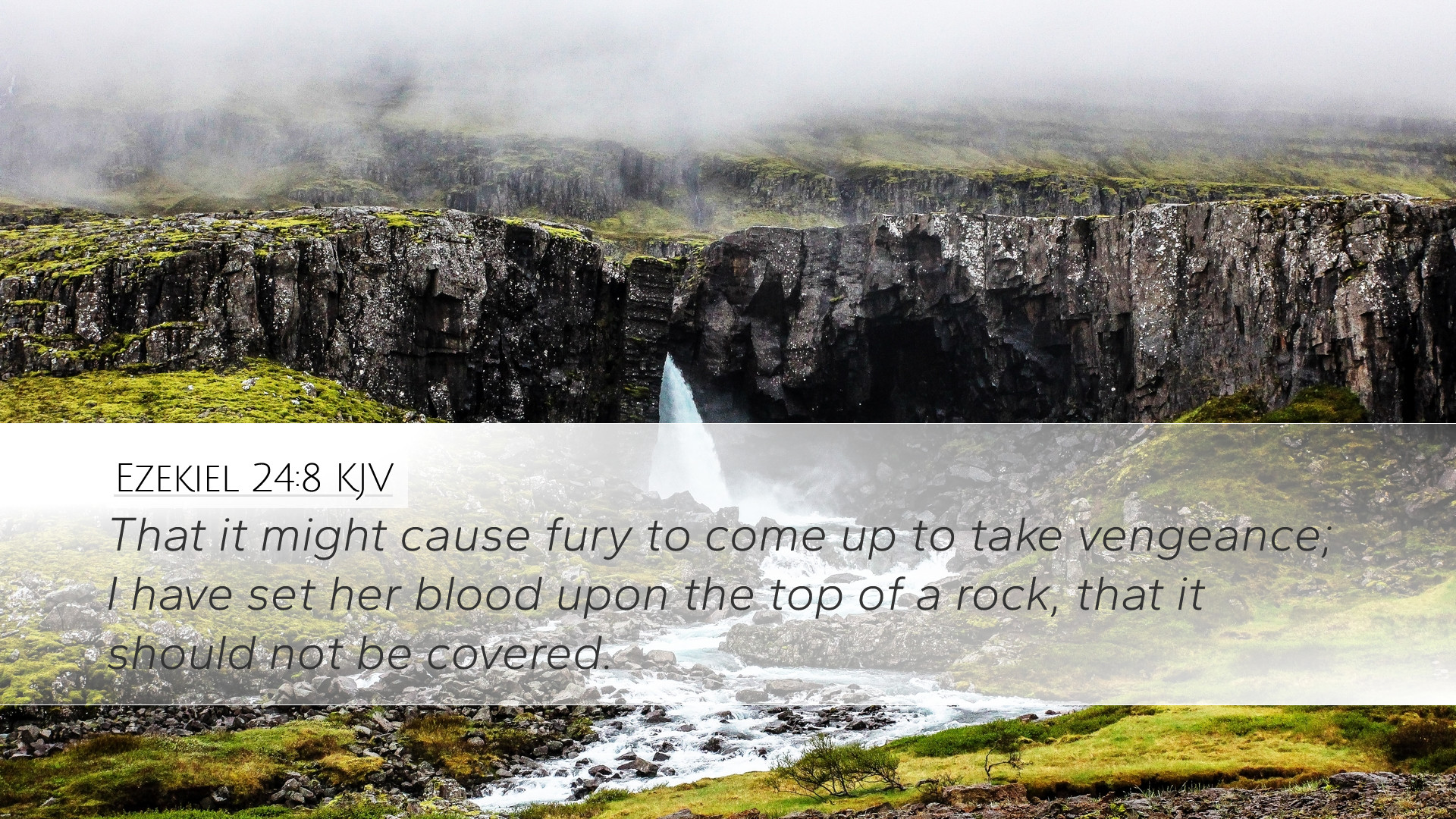Bible Commentary on Ezekiel 24:8
Bible Verse: "That it may cause fury to come up to take vengeance; I have set her blood upon the top of a rock, that it should not be covered." (Ezekiel 24:8, KJV)
The verse Ezekiel 24:8 is a profound declaration within the prophetic proclamation that speaks of divine justice and the consequences of sin. It emphasizes the seriousness of bloodshed and the inevitable judgment that follows unredressed violence. Drawing insights from esteemed public domain commentators such as Matthew Henry, Albert Barnes, and Adam Clarke will shed light on its theological implications.
Contextual Overview
Ezekiel, a prophet during the Babylonian exile, delivered messages of warning and hope to the Israelites, focusing on their sins and the forthcoming judgment from God. Chapter 24 details the fate of Jerusalem, presenting a vivid metaphorical expression of the city as a cooking pot, with the blood of its people symbolizing the city’s sin and consequent punishment.
Interpretation of Key Phrases
This verse contains critical elements that require deeper exploration:
-
"Cause fury to come up to take vengeance":
Henry emphasizes that God's wrath is not arbitrary but is incited by the persistent disobedience and iniquity of His people. The divine justice invoked is portrayed as a necessary response to the avowed transgressions.
-
"I have set her blood upon the top of a rock":
Barnes elucidates this imagery as indicating how the blood of the slain cannot be hidden or overlooked. It signifies that God ensures that the heinous acts committed remain evident and unredressed, which serves to maintain His justice before the nations.
-
"That it should not be covered":
Clarke interprets this phrase to mean that the guilt of the nation cannot be concealed. Just as blood on a rock is exposed, so too is the sin of the people laid bare before God and the world, demanding acknowledgment and action.
Theological Implications
The fundamental lesson from Ezekiel 24:8 carries significant theological weights, such as:
-
God's Justice:
Each commentator emphasizes the unwavering nature of God’s justice. The bloodshed represents the weight of sin which God will not ignore. The presence of divine vengeance serves as a reminder that sin has grave consequences, maintaining a moral order in creation.
-
Human Responsibility:
This passage directs attention toward human accountability, emphasizing that individuals and nations alike must reckon with the sins committed. Henry highlights that national sins lead to corporate judgment, reminding readers of the collective responsibility before God.
-
The Foretelling of Judgment:
Barnes points out that Ezekiel’s prophecies give insight into the nature of prophetic warning. They reflect God’s desire for repentance and the opportunity provided to return to Him, although judgment remains the final outcome for many.
-
Hope Amidst Judgment:
While the verse conveys a stark image of punishment, Clarke notes that the narratives of Ezekiel also include themes of eventual restoration. After the judgment, God’s people are offered hope for redemption and renewal, illustrating God's mercy and grace that balance His justice.
Application for Today's Believers
For pastors, students, and theologians, several applications emerge from this verse:
-
Understanding Divine Justice:
Faith leaders are called to teach congregants about the nature of God’s justice, ensuring a balanced understanding that encompasses both His love and His holiness.
-
Revival through Responsibility:
There is an ever-present call to repentance, illustrating how acknowledging sin leads to spiritual awakening. Churches can foster environments where confession and accountability are encouraged, reflecting the weight of sins highlighted in the text.
-
Hope in Prophecy:
Preaching must also exude hope, depicting how even amidst judgment, God’s plan includes restoration. This duality empowers believers to persist in faith, reminiscent of ancient Israel’s journey.
Conclusion
Ezekiel 24:8 serves as a critical reminder of God’s nature—His justice, His mercy, and the inevitability of consequences stemming from sin. In merging the insights from Matthew Henry, Albert Barnes, and Adam Clarke, readers are equipped to delve deeply into the text, urging them to reflect, repent, and rejoice in the hope that God ultimately offers.


